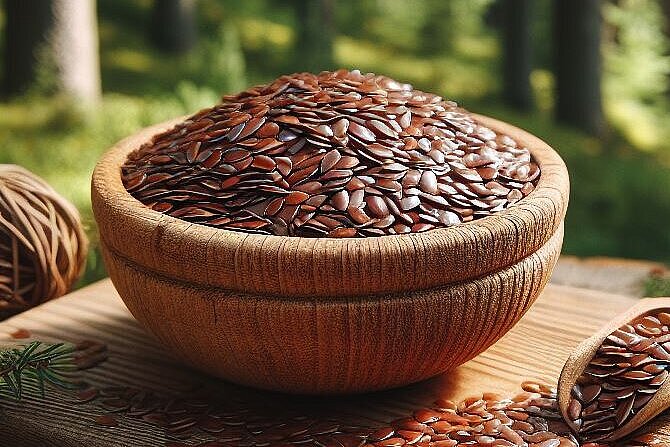Psyllium husks

Psyllium husks are the dried seed husks of the Plantago ovata plant, also known as Indian plantain. They are often used as a dietary supplement for humans and animals as they contain a lot of fiber and can have a positive effect on digestion. But what are the advantages and disadvantages of psyllium husks for dogs? And how are they dosed correctly? In this article, you can find out more about this natural remedy and how you can give it to your dog.
How do psyllium husks work in dogs?
Psyllium husks consist of around 65% soluble and 35% insoluble fiber. The soluble fiber can bind water and thus swell up. The insoluble fiber increases stool volume and promotes bowel movement. Psyllium husks also contain mucilage, which can protect and soothe the intestinal mucosa.
Psyllium husks can therefore help with various digestive problems, such as
- Diarrhea: Psyllium husks can bind the increased water flowing into the intestine and thus improve the consistency of the stool from liquid to mushy. They can also help to normalize intestinal peristalsis so that the faeces remain longer in the posterior colon, where water can be removed again. They can also serve as food (prebiotic) for desirable intestinal bacteria and thus help to push back diarrhea pathogens.
- Constipation: Psyllium husks can make the stool softer and more slippery by absorbing water and swelling. This facilitates transportation through the intestines and elimination. They can also stimulate bowel movements by increasing stool volume.
- Heartburn: Psyllium husks can bind and neutralize stomach acid by forming a protective film on the stomach lining. This can alleviate the burning sensation in the oesophagus.
- Giardia: Psyllium husks can make it more difficult for Giardia to attach to the intestinal mucosa by forming a film of mucus. This can promote the excretion of the parasites and fight the infection.
- Obesity: Psyllium husks can increase the feeling of satiety by swelling in the stomach and increasing the volume of food. This can reduce food intake and support weight loss.
- Diabetes: Psyllium husks can lower blood sugar levels by delaying the absorption of carbohydrates from the intestine. This can regulate insulin production and improve diabetes control.
- Anal gland problems: Psyllium husks can improve the function of the anal glands by making the stool firmer and more voluminous. This can facilitate the emptying of the glands and prevent inflammation.
How are psyllium husks for dogs dosed?
Psyllium husks should always be soaked in sufficient liquid before giving them to the dog. This prevents them from getting stuck in the throat or intestines and causing constipation or intestinal obstruction. The recommended dosage of psyllium husks for dogs depends on the animal's body weight. The rule of thumb is
- Dogs up to 20 kg: 5 g psyllium per day
- Dogsover 21 kg : 10 g psyllium per day
The psyllium husks should be mixed with at least ten times the amount of water and allowed to swell for at least half an hour before giving them to the dog. They can also be mixed into the food or given as a mash. Psyllium husks should always be freshly prepared, otherwise they may lose their effect or spoil.
What side effects can psyllium husks have on dogs?
Psyllium husks are generally well tolerated and have few side effects. Nevertheless, a few points should be borne in mind to avoid possible risks:
- Psyllium husks should not be fed dry, as this can lead to choking or intestinal obstruction.
- Psyllium husks should not be overdosed, as this can lead to flatulence, abdominal pain or diarrhea.
- Psyllium husks should not be taken together with medication as they can impair its absorption from the intestine. There should be at least two hours between taking psyllium husks and medication.
- In dogs with intestinal obstruction, intestinal constriction, stomach ulcers, kidney stones or other diseases of the digestive tract, psyllium husks should only be administered after consultation with the vet.
- Psyllium husks should not be fed to dogs that are allergic or intolerant to psyllium husks or other components of the plant.
Psyllium husks are a natural and effective means of supporting and regulating digestion in dogs. They can help with various complaints such as diarrhea, constipation, heartburn, giardia, obesity, diabetes or anal gland problems. However, care should always be taken to ensure the correct dosage, preparation and use in order to avoid possible side effects.
If you notice any signs of hypersensitivity or poisoning in your dog, you should see your vet immediately. We are not a substitute for a vet, but we try to be as accurate as possible. Every dog reacts differently and we recommend you get a second opinion or consult your vet if in doubt.
Stay healthy and take good care of your four-legged friend!😊
Similar to Psyllium husks
Linseeds are the seeds of the flax plant (Linum usitatissimum), which is primarily known for its fibers. The fibers are processed into linen fabric, which is used for clothing or bedding. The seeds...
Chia seeds have many positive properties for your dog's health. Here are some of them: They aid digestion by promoting intestinal flora and preventing constipation. They also bind water and swell...
Wheat bran has several positive effects on your dog's health: It promotes digestion. Wheat bran swells in the gastrointestinal tract and increases the volume of intestinal contents. This stimulates...
Oat bran is a by-product of oatmeal production. When the oat grain is steamed, rolled flat and dried, oat flakes are produced. During this process, the outer layers of the grain are separated and...



